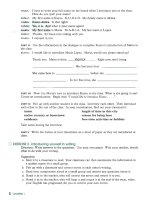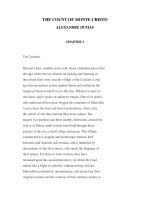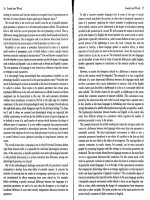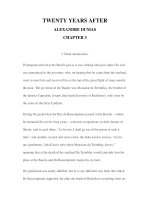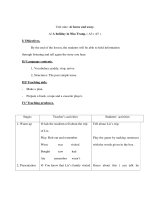History or historycal corres 3 pps
Bạn đang xem bản rút gọn của tài liệu. Xem và tải ngay bản đầy đủ của tài liệu tại đây (99.44 KB, 6 trang )
If this were lengthened further, the
close of the second pair of inverted
commas would be delayed
accordingly:
‘Indeed it is,’ said my mother. ‘When
will you be able to get to us? Need I
say ‘‘the earlier the better’’? You
know that we’ll be up at the crack of
dawn.’
" Inverted commas are used to enclose
titles.
Have you read ‘Angela’s Ashes’ by
Frank McCourt?
Alternatively, the title can be
underlined or, in print, italicised.
Inverted commas will not then be
needed.
" Inverted commas are used to enclose
quotations.
Like Coriolanus, I often feel that
‘there is a life elsewhere’.
Note that the final full stop comes
outside the inverted commas enclosing
the quotation. Incorporating a
quotation in a sentence is different
from punctuating direct speech.
See
INDIRECT/REPORTED SPEECH.
See
TITLES.
invisible (not -able)
irational Wrong spelling. See
IRRATIONAL.
iridescent (not -rr-)
irony or sarcasm? IRONY is subtle, amusing, often witty.
SARCASM is deliberately hurtful and
intentionally cruel.
Irony comes from a Greek word
meaning ‘pretended ignorance’.
INVISIBLE
102
Sarcasm comes from a Greek word
meaning ‘to tear the flesh with one’s
teeth’.
Irony relies on those with insight
realising that what is said is the opposite
of what is meant.
Mr Bennet in Jane Austen’s Pride and
Prejudice frequently makes ironical
remarks which only his more perceptive
listeners will understand. When he tells
one of his less musical daughters that she
has delighted the company with her piano
playing for long enough, she takes his
remarks at face value. Jane and Elizabeth,
two of her sisters, know exactly what he
really meant.
Sarcasm sometimes uses this technique
of irony and says in a very cutting way
(which will be very clearly understood)
the opposite of what is really meant.
When a teacher says, ‘Brilliant!’, to a
pupil who fails yet again, he is being
sarcastic and ironical at the same time.
When a teacher says, ‘Have you lost your
tongue?’ to a pupil, he is being sarcastic.
irrational (not -r-)
irrelevant (not irrevelant: think of ‘does not relate’)
irreparable
irreplaceable See
SOFT C AND SOFT G.
irrepressible
irresistible
irresponsible
irrevelant Wrong spelling. See
IRRELEVANT.
irreversible
irridescent Wrong spelling. See
IRIDESCENT.
IRRIDESCENT
103
TEAMFLY
Team-Fly
®
-ise or -ize? Most words ending with this suffix can be
spelt -ise or -ize in British English.
American English is more prescriptive and
insists on -ize whenever there is a choice.
House-styles in Britain vary from
publisher to publisher and from
newspaper to newspaper. (You may have
noticed that in this book I favour -ise.)
When making your choice, bear these
two points in mind:
" These nineteen words have to be -ise:
advertise, advise, apprise, arise,
chastise, circumcise, comprise,
compromise, despise, devise, disguise,
enfranchise, excise, exercise,
improvise, revise, supervise, surprise,
televise.
" Only one verb of more than one
syllable has to be -ize: capsize.
(One syllabled verbs like ‘seize’ still
need care, of course.)
Whatever you decide, be consistent within
one piece of writing and be consistent
with derivatives. If you use ‘realize’ in
one paragraph, you must use ‘realization’
and not ‘realisation’ at another point in
the same piece. If you use ‘sympathize’,
then you must refer to ‘sympathizers’ and
not to ‘sympathisers’ elsewhere.
Many authorities prefer to use -ize when
there is a choice. In practice, many
writers prefer to use -ise because this
choice is relatively trouble-free.
The decision is yours!
isn’t Place the apostrophe carefully. (not is’nt)
itinerary (five syllables, not four as it is often
mispronounced and misspelt)
-ISE OR -IZE?
104
its or it’s? ITS is a possessive adjective like ‘her’ and
‘his’:
The book has lost ITS cover.
ITS beauty has faded.
IT’S is a contraction of ‘it is’ or ‘it has’:
IT’S very cold today. (= it is)
IT’S been a long winter. (=it has)
If you are ever in doubt, see if you can
expand ‘its/it’s’ to ‘it is’ or ‘it has’. If you
can, you need an apostrophe. If you can’t,
you don’t.
Remember too that contractions like
‘it’s’ are fine in informal contexts but
should be avoided in formal writing.
When it’s inappropriate to use slang, it is
inappropriate to use these contractions.
You have to write the forms in full.
ITS OR IT’S?
105
J
jealous (not jelous)
jealousy
jeopardise/jeopardize Both spellings are correct.
jeopardy
jewelry/jewellery Both spellings are correct.
(not jewlery as the word is often
mispronounced)
jodhpurs
journey (singular) journeys (plural)
See
PLURALS (iii).
judgement/judgment Both spellings are correct.
judicial or judicious? JUDICIAL =pertainingtocourtsoflaw
and judges
JUDICIOUS = showing good judgment,
wise, prudent
The words are not interchangeable. There
is a clear distinction in meaning, as you
can see.
A JUDICIAL decision is one reached in a
law court.
A JUDICIOUS decision is a wise and
discerning one.
106
K
keenness keen + ness
kerb See
CURB OR KERB?.
kernel See
COLONEL OR KERNEL?.
kibbutz (singular) kibbutzim (plural)
See FOREIGN PLURALS.
kidnap kidnapped, kidnapping, kidnapper
An exception to the 2-1-1 rule.
See
ADDING ENDINGS (iv).
kneel kneeled or knelt, kneeling
knew or new? Use these exemplar sentences as a guide:
I KNEW the answer.
Nanette has NEW shoes.
knife (singular) knives (plural)
See
PLURALS (v).
know or no? Use these exemplar sentences as a guide:
IKNOWthe answer.
NO, they cannot come.
We have NO milk left.
knowledge
knowledgeable/ Both spellings are correct.
knowledgable
107

